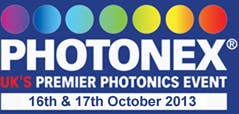IMAGE: Photonex--the UK’s Premier Photonics Event--was held in Coventry, England on October 16 and 17, 2013. (Image credit: Photonex)
Coventry, England--Carlos Lee, director general of the European Photonics Industry Consortium (EPIC), moderated a discussion on 16 October 2013 with executives from the UK photonics industry. In conjunction with the 2013 Photonex UK exhibition, he approached the discussion from an international perspective of how various regions in the world and countries in Europe support their photonics industry.
While governments need to ensure a supportive legal and regulatory framework for companies to blossom, Anke Lohmann, director of Photonics at UK government agency ESP KTN (Electronics, Sensors, Photonics Knowledge Transfer Network) pledged for industry engagement and collaboration between companies to address specific needs for ESP KTN to focus on. Mark Sims, professor at the Space Research Centre of the University of Leicester requested on the other hand for the UK Science budget to be increased as soon as possible "by keeping it flat it is being eroded by inflation putting at risk the UK’s capability for medium and long-term growth."
The UK, which has historically been strong in manufacturing but then shifted focus to banking decades ago, wants to go back and rebalance the economy to include manufacturing, which it recognizes is imperative to create jobs, create growth, and avoid stagnation. Photonics will certainly play a role as one of the features of our industry is that it comprises a high proportion of small companies, which anticipate a higher recruitment percentage growth than larger companies.
The UK claims 1500 companies in photonics with a direct employment of 70,000 and a production output of $17 billion dollars (£10.5 billion pounds). This is about 20% of Europe's total and the UK expertise is well balanced, with a distribution based on employment of optical systems (20%), medical (19%), production (15%) and defense (10%). The UK has particular expertise in various fields such as space, life science, defense, sensing (food, security, gas), and 3D advanced manufacturing. A clear sign of the expertise in the UK in these sectors are the many historical acquisitions such as SPI Lasers by Trumpf, CIP Technologies by Huawei, Barr & Stroud by Thales, Microlase Optical by Coherent and many more such examples.
John Lincoln, appointed CEO of the UK Photonics Leadership Group (PLG) said that it was a priority to make a connection between photonics and the higher level of the value chain already being supported by the UK. David Gahan, a photonics industry veteran and currently a consultant, asked the UK TSB (Technology Strategy Board) to "provide follow-on funding into the higher levels of TRL 6-7 (Technology Readiness Level) to support demonstrators." Remaining competitive requires a company to have access to skilled staff. Malcolm Varnham, VP Intellectual Property and Co-Founder of SPI Lasers asked for emphasis on the importance of education and training.
The show itself has much improved, after a dip in 2009 following the banking crisis, the UK's only "photonics" exhibition has grown to 105 exhibitors, a level not seen for many years. Maybe it was due to a general improvement of the photonics market or because the organizers have added a co-located vacuum technologies exhibition, or the application-related sessions to their program such as nano and bio-imaging and space applications. The event has also developed a strong Vision UK branding which supports its claim to be the primary European event for vision technology in 2013.
SOURCE: EPIC; http://www.epic-assoc.com/
